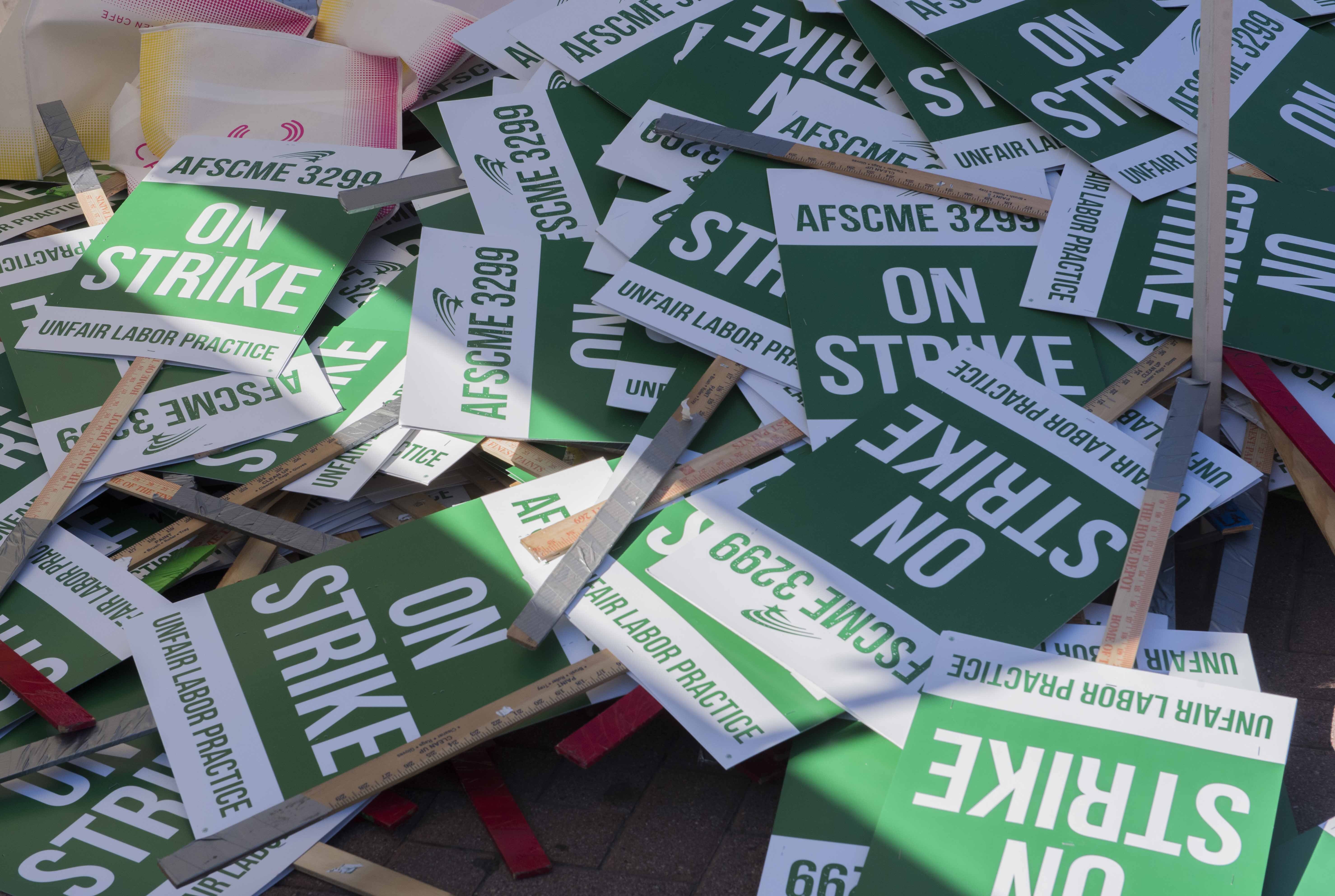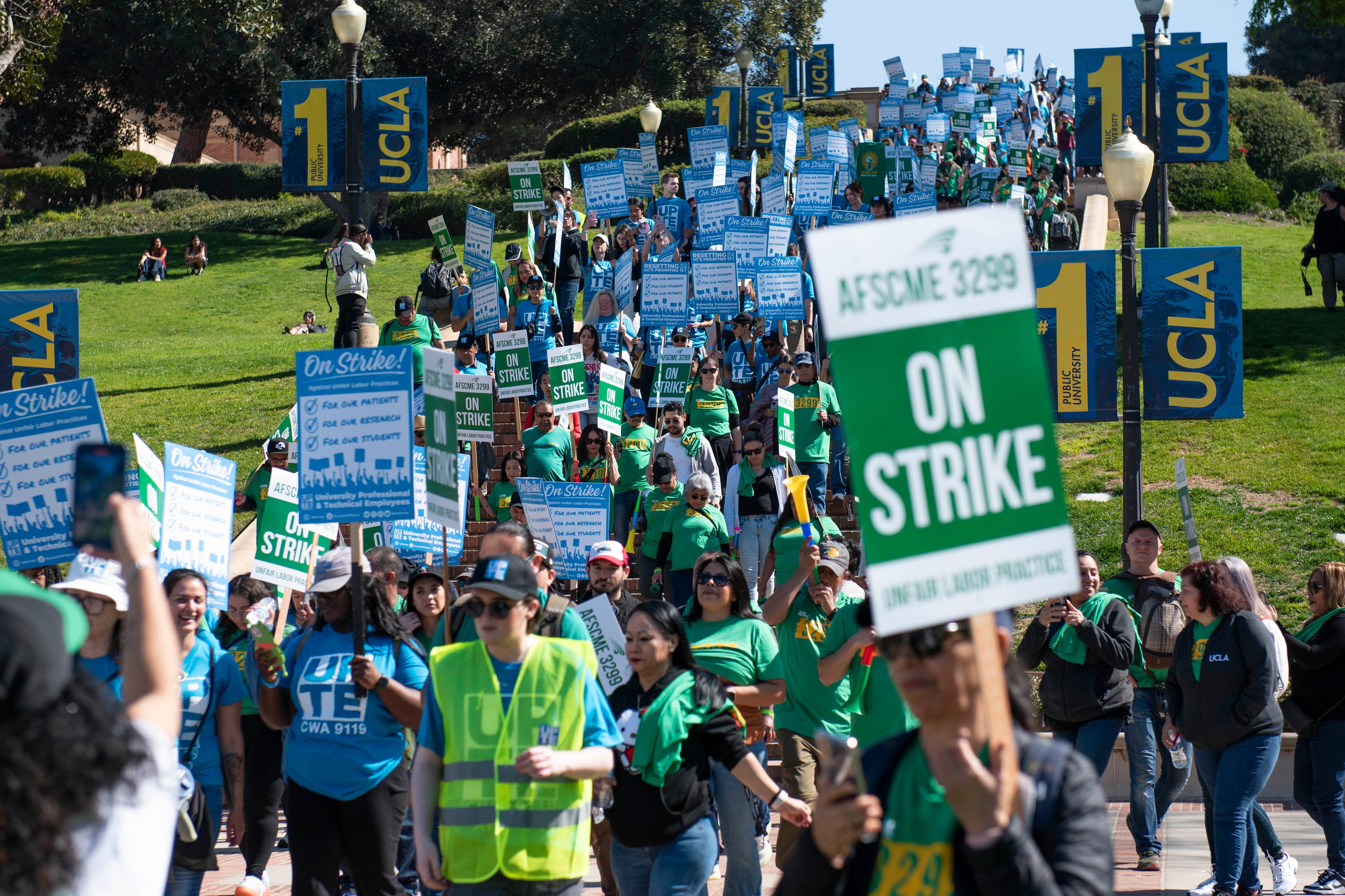UPTE-CWA 9119, AFSCME Local 3299 negotiations with UC remains ongoing
The American Federation of State, County and Municipal Employees Local 3299 and the University Professional and Technical Employees-Communications Workers of America 9119 picket. (Andrew Ramiro Diaz/Photo editor)
By Vivian Stein
June 8, 2025 7:02 p.m.
Picket lines dotted with workers in union T-shirts hoisting signs and chanting into megaphones have become a familiar sight across UC campuses this year.
Members of the American Federation of State, County and Municipal Employees Local 3299 – which represents over 37,000 service, patient care and skilled craft workers – and the University Professional and Technical Employees-Communications Workers of America 9119 – which represents over 18,000 researchers and technical workers – struck four times throughout the 2024-2025 academic year. The unions protested stalled contract negotiations, alleged unfair labor practices and understaffing.
Contract negotiations between AFSCME Local 3299 and the UC began in January 2024, while UPTE-CWA 9119 began bargaining in June 2024. As of June 2025, neither union has reached a contract agreement with the University.
Todd Stenhouse, a spokesperson for AFSCME Local 3299, said he believes the University is in a strong position to address ongoing issues faced by staff, including employees sleeping in their cars or commuting several hours to work.
“It is the frontline workforce that makes this institution what it is, and it is the failure to invest in that frontline workforce … that is hollowing out that university system,” Stenhouse said.
AFSCME Local 3299 struck for the first time this academic year in November and staged a two-day walkout, alleging that the University bargained in bad faith throughout contract negotiations.
The strike prompted dining hall closures, menu consolidations and limited bathroom cleaning schedules across campus.
[Related: AFSCME Local 3299 rallies together for 2-day strike against UC]
While UPTE-CWA 9119 did not strike at UCLA in November, the union struck at UC San Francisco on Nov. 20 and Nov. 21 – also alleging the UC engaged in unfair bargaining practices.
In February, both unions led UC-wide strikes, bringing out more than a thousand union members at UCLA.
The action was prompted by what union leaders alleged were stalled contract negotiations, rising staff vacancies, UC’s refusal to bargain in good faith and the implementation of policies restricting speech and organizing efforts.
Stenhouse said AFSCME Local 3299 members recently encountered restrictions on speech and assembly, which he said limited their ability to speak out about job quality and ongoing staffing shortages.
[Related: AFSCME Local 3299, UPTE-CWA 9119 march across UCLA campus, disrupting dining halls]
Max Belasco, a co-chair of UPTE-CWA 9119’s UCLA chapter, said he believes the union’s proposed offers were thoroughly researched and based on standards at comparable institutions but that UC representatives have failed to respond meaningfully at the table.
In an emailed statement, UC Office of the President spokesperson Heather Hansen said the recent strikes reflect a recurring pattern in labor negotiations. Similar strike activity occurred during previous bargaining cycles with the same unions – with the unions striking five times together during its 2019-2020 contract negotiations, she added in the statement.
In April, UPTE-CWA 9119 led another strike, which AFSCME Local 3299 joined in solidarity. UPTE-CWA 9119 leaders alleged that the UC withheld information about staffing vacancies and continued to engage in bad-faith bargaining.
[Related: UPTE-CWA 9119, AFSCME Local 3299 to strike April 1 for 3rd time in academic year]
The UCOP announced a systemwide hiring freeze in March, prompting another joint strike May 1. Belasco said at the time that the freeze would worsen ongoing staffing shortages in essential campus services – particularly those relating to research.
In an emailed statement, UCLA Housing said it made adjustments during strike periods to maintain essential campus services. It added in the emailed statement that UCLA consolidated dining operations, adjusted housekeeping schedules and implemented alternate mail delivery methods.
Operational changes also included adjusted dining hours, simplified menus and revised bathroom cleaning schedules. UCLA Housing said its methods were effective and added that it will continue to prioritize contingency planning to respond to future labor actions.

[Related: UPTE-CWA 9119, AFSCME Local 3299 strike in response to UC system hiring freezes]
Despite public pressure and multiple strikes, negotiations between the unions and the UC remain ongoing.
Jacob Creer, a clinical equipment specialist and member of the AFSCME Local 3299 bargaining team and executive board, said he commutes from Fullerton, California, to the Ronald Reagan UCLA Medical Center and now pays for oil changes in frequent installments due to the wear on his car’s brakes. Despite the fact that his job helps the hospital save money, he said he still cannot afford to live anywhere near UCLA.
Davina Woods, a senior custodian and member of AFSCME Local 3299’s executive board who commutes 120 miles round-trip every day from San Bernardino, said she pays more than $100 a week on gas alone. To stay afloat, she said she sells small items such as gloves and hats and shares a home with her adult children.
“We’re the ones that keep this place running smoothly,” she said.
[Related: Long commutes, short-staffed – ‘We want to live,’ union leaders demand from UC]
Dan Russell, UPTE-CWA 9119’s president and chief negotiator, said the University has issued statements to lawmakers that say the strikes cost them millions of dollars a day but publicly downplay their impact.
“We’re hoping that the University is ready to work with us to address this crisis,” Russell said. “It’s really time for us to come together and get this done.”
Stenhouse said while the university has offered certain raises – such as a proposed $25 minimum wage – those proposals do not match the scale of inflation. The union brought forward new counterproposals in April, but UC representatives walked away from the table, he said.
The UC said it presented AFSCME Local 3299 with a “last, best and final offer” April 30, proposing a $25 hourly minimum wage and a 5% raise – terms that align with the union’s original wage demands.
While Hansen acknowledged that workers have a legal right to strike, she added that the strikes are disruptive to campus and academic health center operations while also costing the University millions of dollars.
She said the UC’s bargaining strategy centers on offering competitive compensation and transparent communication with unions to reach fair agreements, adding that the University aims to treat all groups fairly and approach negotiations with “realistic proposals grounded in operational reality.”
However, Stenhouse said the unions’ movement has only gained momentum, with their workers more united than ever.
“They have never been more resolved to stand up for themselves, for each other, for their families because they know they’re on the right side,” Stenhouse said.
